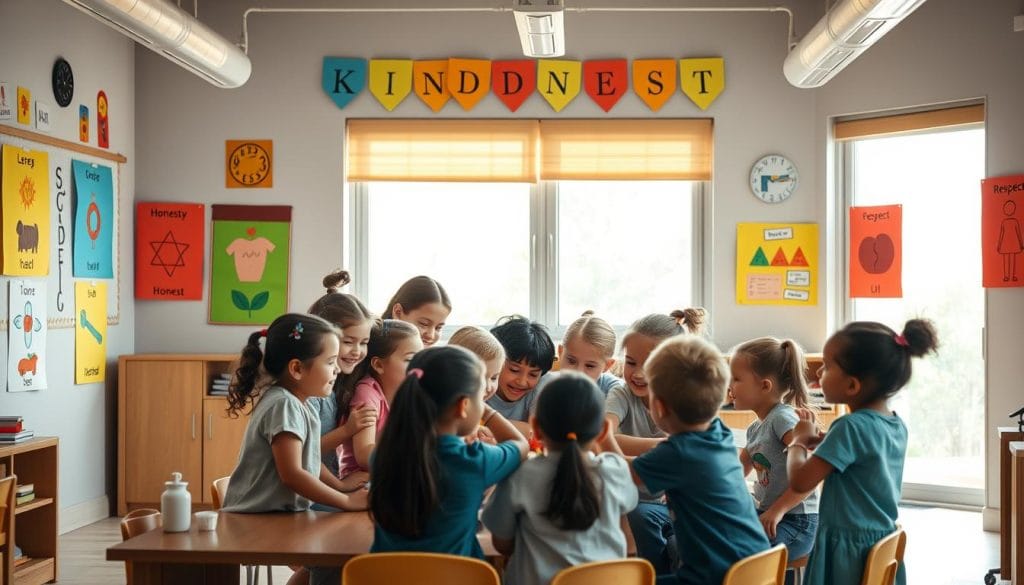Did you know that Aristotle said we become good by doing just, self-controlled, and brave acts over and over1? This idea shows how important habits are in making a child’s character. As a parent, you can teach your child important moral lessons. These lessons will help them grow and thrive.
Charlotte Mason believed in teaching children to be obedient, attentive, and truthful1. You can teach these virtues by using activities like role-playing and limiting screen time. These actions help build a strong moral base1.
Parents are key in teaching children to be obedient and diligent1. Stories and examples of good deeds can motivate kids. They make moral lessons more engaging and memorable1.
Key Takeaways:
- Habit formation is key to developing virtuous character in children
- Foundational habits like obedience, attention, and truthfulness lay the groundwork for moral strength
- Parents play a crucial role in guiding children towards good habits and moral behavior
- Storytelling and examples of admirable actions can inspire children to emulate moral virtues
- Celebrating small progress in habit formation is important as it takes time to develop
Importance of Teaching Moral Lessons Early
Teaching ethics to kids early is key for their growth and happiness. Ethics for kids and nurturing good behavior help them make good choices and build strong relationships. Studies show that virtues like honesty and kindness lead to a fulfilling life2.
Why Early Lessons Matter
Moral lessons in early years shape a child’s character and decision-making. People with strong moral character inspire trust and make better decisions2. They also report higher happiness levels2.
Virtues are important in many religious traditions for personal growth2. Virtuous kids have better mental health and success in life2.
Lasting Impact on Development
Early lessons deeply influence a person’s development. Media and culture shape virtues like honesty and kindness2. Good moral values help in career success2.
Virtues like honesty and kindness promote emotional intelligence and social skills2. Teaching these traits early is vital for a child’s future well-being.
“Habits serve as a lever, lifting children out of disobedience or laziness and into patterns of obedience and diligence. The habits cultivated in homes reflect not just what is taught, but who parents are and what they love.”
Teaching moral lessons early is crucial, as shown by the interest in related articles3. This interest highlights the importance of ethics for kids and nurturing good behavior for their development.
Research links gratitude to happiness, showing that thankful people are happier4. Teaching gratitude to children is essential for their emotional and mental health4. Activities like gratitude journals and thank you cards help instill appreciation in kids4.
Key Moral Lessons Every Child Should Learn

As parents, teaching our kids the right values is key. Values like honesty, kindness, and responsibility are crucial. They help our children grow into caring and responsible people. Let’s look at the important lessons every child should learn to face life’s challenges with integrity.
Honesty: The Foundation of Trust
Honesty is essential for strong relationships. Teaching kids to be truthful makes them reliable and trustworthy. Honesty builds trust and helps kids feel good about themselves and their actions.
Kindness: Building Empathy
Kindness is more than just being nice; it’s about understanding others. When kids learn to be kind, they see things from different views. This leads to more compassion and appreciation for diversity. Kindness also helps kids make strong connections and improve the lives of those around them.
Responsibility: Owning Your Actions
Responsibility is key for self-discipline and growth. Teaching kids to own their actions helps them understand the results of their choices. This sense of responsibility prepares kids for success and teaches them to work hard and help their communities.
Teaching these moral lessons to our kids is a great investment in their future. As they face life’s challenges, honesty, kindness, and responsibility will guide them. They will become ethical, empathetic, and strong individuals.5
By teaching these values, we prepare our kids to be caring and responsible leaders of tomorrow6.
How to Introduce Moral Lessons in Daily Life
Everyday moments are great for teaching kids moral lessons. Sharing toys or cleaning up can teach important values. Storytelling also helps by showing kids good role models7.
Using Everyday Situations
Fables are great for bedtime stories, teaching kids valuable lessons7. They use animals to teach moral messages7. Stories like “The Wolf in Sheep’s Clothing” teach about deception and responsibility7.
Storytelling as a Tool
Stories are powerful for teaching morals. Charlotte Mason believed in using stories to inspire kids7. They can motivate kids to act with kindness and purpose7.
Aesop’s Fables, written in Greek, have been translated to teach morals7. They still teach us today, like the value of kindness7. Stories like “The Lion and the Mouse” show the power of gentleness7.
Engaging stories help parents teach morals to kids. By using stories and everyday moments, we can shape the next generation’s values7.
Creative Ways to Teach Morals Through Play
Teaching morals to kids can be tricky, but play makes it fun. Games, role-playing, and interactive fun help kids learn ethics. This way, parents and teachers can teach morals in a fun, meaningful way.
Games that Foster Ethical Thinking
Games like Simon Says teach kids to obey and follow rules8. These games help kids control their impulses and respect authority. They also learn about the effects of their actions.
Nature challenges help kids tell the truth and pay attention. These activities make them more honest and alert.
Role-Playing Scenarios
Role-playing lets kids practice making moral choices safely9. They act out different situations, learn to see things from others’ viewpoints, and solve ethical problems. This method strengthens moral lessons and boosts communication and problem-solving skills.
| Moral Lesson | Playful Activity | Key Takeaway |
|---|---|---|
| Honesty | Nature Scavenger Hunt | Accurate observation and truthful reporting |
| Kindness | Cooperative Board Games | Teamwork, empathy, and consideration for others |
| Responsibility | Chore-Based Challenges | Understanding consequences and ownership of actions |
Using these creative methods, teaching morals becomes more fun and effective. Play helps kids grasp important moral lessons. These lessons will help them throughout their lives89.
Encouraging Open Discussions About Morality

Talking openly about morality with kids is a great way to teach them values and character. Parents can make a safe space for kids to think about right and wrong. This helps them apply what they learn to everyday life.
Creating a Safe Space for Conversations
When families talk openly about values, kids do better in social situations. This is because they learn from shared values10. Parents who talk openly at home help their kids develop social skills10.
By not judging, kids feel safe to share their thoughts. This leads to better understanding and growth.
Using Current Events as Teaching Moments
Current events are great for teaching kids about moral choices. Parents who teach kids about social issues help them stand up for what they believe. This is without using violence10.
By talking about what’s happening in the world, kids learn to use what they know. This helps them understand values and character better.
Open talks about morality help kids think critically. This prepares them for the world’s challenges. By doing this, parents give their kids a strong base for values and character10.
The Role of Media in Teaching Morals
Media can teach kids important morals. But, it’s key to pick content that’s right for their age. Talking about what they watch or read helps parents teach valuable lessons11.
Selecting Age-Appropriate Content
Parents need to think about what’s good for their child’s age. For example, Australia made a law to keep kids under 16 off social media. This shows how important it is to choose media that fits your family’s values11.
Discussing Lessons from Movies and Books
It’s not just about watching or reading. Parents should talk to their kids about what they see or read12. Stories like “The Road” by Cormac McCarthy can start big conversations. They help kids think deeply about right and wrong12.
But, too much screen time can be bad. It makes kids’ attention split. Still, media can teach kids a lot, like through quizzes and contests11.
| Media Impact on Teaching Morals | Positive Aspects | Negative Aspects |
|---|---|---|
| Storytelling and Moral Lessons |
|
|
| Educational Resources |
|
|
Choosing the right media and talking about it helps parents teach important lessons11. It’s a tricky job, but with care, parents can use media to teach kids valuable lessons11.
The Importance of Leading by Example
As parents, our actions greatly shape our children’s growth. By being positive role models, we teach them good behavior and important moral lessons13. This helps them learn social skills and deal with life’s challenges, especially for those with Autism Spectrum Disorder13.
Modeling Positive Behavior
Children watch and learn from the adults around them. When we show kindness, honesty, and responsibility, they are more likely to follow our example14. By talking about our struggles and how we solve them, we teach them to be resilient and self-regulated14.
When we practice healthy habits like exercise, our kids are more likely to do the same. This can improve their skills and overall health14.
Sharing Personal Experiences
Talking about our moral choices can deeply impact our children’s understanding15. By sharing our thought processes and feelings, we give them valuable lessons that can guide their moral growth15. Being part of a Christian community and participating in church activities also helps us model the values we want our children to have15.
By being positive role models, we can teach our children important lessons that will last a lifetime. Our actions and experiences have a significant impact on shaping the next generation.
Reinforcing Moral Lessons Through Praise
Positive reinforcement is key in teaching good behavior and character building in kids. When parents praise their kids’ hard work and effort, it shows them that trying hard can solve problems16. This method not only encourages good actions but also makes kids feel more confident and proud of themselves.
But, it’s crucial to find the right balance. Parents should also help kids see their own growth and achievements17. This helps kids develop a mindset that sees challenges as chances to learn and grow.
The Power of Positive Reinforcement
Research shows that positive reinforcement is vital for kids with autism16. It helps them learn new skills, behave better, and make friends. This method is powerful in teaching kids to do well.
Balancing Criticism and Encouragement
Criticism is sometimes needed, but it should always be balanced with praise. Using “I” statements can make disagreements less tense and improve talking by up to 60%17. Role-playing can also teach kids how to handle conflicts, making them more confident by 75%17.
By mixing constructive feedback with positive reinforcement, parents can help their kids grow. This way, kids learn to face challenges and become well-rounded individuals.
“Praise is one of the most powerful tools we have to nurture good behavior and character in children. It’s not just about what they do, but the effort and determination they put in.” – Dr. Jane Doe, child psychologist
Measuring the Impact of Moral Education
As parents and educators, it’s key to check if moral education works. We can see if it changes kids’ behavior and get feedback from teachers and caregivers. This helps us understand how well we’re teaching kids to be ethical18.
Observing Changes in Behavior
One clear way to see moral education’s effect is by watching how kids act. Look for signs of more empathy, honesty, and responsibility in their daily life18. As they learn these values, you might see them make better choices and treat others better19.
Feedback from Teachers and Caregivers
Also, getting feedback from teachers and caregivers gives a full view of a child’s moral growth. They can share how the child’s actions and choices have changed over time20. This feedback helps you adjust your teaching to make sure the lessons stick and positively shape the child’s character.
Remember, teaching morals is a long journey. Every small step towards teaching values education and ethics for kids is important. These steps help kids grow into well-rounded individuals.
FAQ
Why is it important to teach moral lessons to children early on?
What is the lasting impact of early moral lessons on a child’s development?
What are the foundational habits every child should learn?
How can parents use everyday situations to teach moral lessons?
What are some creative ways to teach morals through play?
How can parents encourage open discussions about morality with their children?
What role does media play in teaching moral lessons to children?
How can parents model the behavior they want to see in their children?
Why is positive reinforcement crucial in moral education?
How can parents measure the impact of moral education on their children?
Source Links
- https://howeverimperfectly.substack.com/p/7-education-is-a-discipline
- https://www.freedomgpt.com/wiki/importance-of-virtue-and-moral-character
- https://www.edutopia.org/grade-level-k-2
- https://themommyscorner.com/teaching-gratitude-to-children/
- https://mercerislandma.com/10-life-lessons-martial-arts-teaches-children/
- https://www.leportschools.com/programs/our-curriculum/
- https://cdn.prod.website-files.com/66f3e5d1760c536281152a0d/67531cb3e9774343a46c209b_1251169449.pdf
- http://teachertomsblog.blogspot.com/2024/12/the-best-and-most-complete-definition.html
- https://theneurodiversityfamilyhub.org/resource/playtime-podium-cultivating-leadership-neurodiverse-children
- https://www.meredithplays.com/homeschool-social-skill-building-considerations/
- https://www.nytimes.com/spotlight/learning-activities-for-students
- https://radicalscholarship.com/
- https://lighthouseautismcenter.com/blog/understanding-social-skills-deficits-autistic-children/
- https://medium.com/authority-magazine/raising-resilient-kids-family-therapist-author-siobhan-chirico-on-strategies-for-nurturing-279cf6242ad5
- https://au.thegospelcoalition.org/article/how-we-misunderstand-servant-leadership/
- https://www.totalcareaba.com/autism/aba-techniques-for-home-use-eee4a
- https://mightymamabear.com/teaching-your-child-about-how-to-handle-conflict/
- https://link.springer.com/article/10.1007/s44202-024-00256-w
- https://utoronto.scholaris.ca/server/api/core/bitstreams/c1559896-4cf1-4728-9210-e8aff6a1295e/content
- https://hrmars.com/papers_submitted/23945/the-concept-and-philosophy-of-integrity-in-teaching-and-learning-based-on-surah-luqman.pdf
